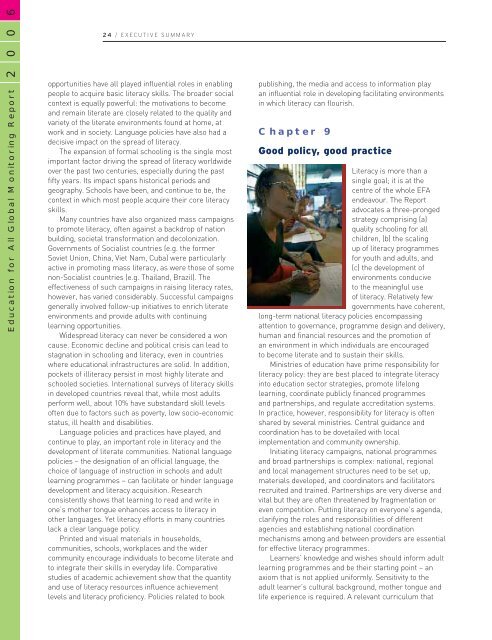literacy for life; EFA global monitoring report, 2006 - Institut de ...
literacy for life; EFA global monitoring report, 2006 - Institut de ...
literacy for life; EFA global monitoring report, 2006 - Institut de ...
You also want an ePaper? Increase the reach of your titles
YUMPU automatically turns print PDFs into web optimized ePapers that Google loves.
0<br />
0<br />
6<br />
24 / EXECUTIVE SUMMARY<br />
2<br />
Education <strong>for</strong> All Global Monitoring Report<br />
opportunities have all played influential roles in enabling<br />
people to acquire basic <strong>literacy</strong> skills. The broa<strong>de</strong>r social<br />
context is equally powerful: the motivations to become<br />
and remain literate are closely related to the quality and<br />
variety of the literate environments found at home, at<br />
work and in society. Language policies have also had a<br />
<strong>de</strong>cisive impact on the spread of <strong>literacy</strong>.<br />
The expansion of <strong>for</strong>mal schooling is the single most<br />
important factor driving the spread of <strong>literacy</strong> worldwi<strong>de</strong><br />
over the past two centuries, especially during the past<br />
fifty years. Its impact spans historical periods and<br />
geography. Schools have been, and continue to be, the<br />
context in which most people acquire their core <strong>literacy</strong><br />
skills.<br />
Many countries have also organized mass campaigns<br />
to promote <strong>literacy</strong>, often against a backdrop of nation<br />
building, societal trans<strong>for</strong>mation and <strong>de</strong>colonization.<br />
Governments of Socialist countries (e.g. the <strong>for</strong>mer<br />
Soviet Union, China, Viet Nam, Cuba) were particularly<br />
active in promoting mass <strong>literacy</strong>, as were those of some<br />
non-Socialist countries (e.g. Thailand, Brazil). The<br />
effectiveness of such campaigns in raising <strong>literacy</strong> rates,<br />
however, has varied consi<strong>de</strong>rably. Successful campaigns<br />
generally involved follow-up initiatives to enrich literate<br />
environments and provi<strong>de</strong> adults with continuing<br />
learning opportunities.<br />
Wi<strong>de</strong>spread <strong>literacy</strong> can never be consi<strong>de</strong>red a won<br />
cause. Economic <strong>de</strong>cline and political crisis can lead to<br />
stagnation in schooling and <strong>literacy</strong>, even in countries<br />
where educational infrastructures are solid. In addition,<br />
pockets of il<strong>literacy</strong> persist in most highly literate and<br />
schooled societies. International surveys of <strong>literacy</strong> skills<br />
in <strong>de</strong>veloped countries reveal that, while most adults<br />
per<strong>for</strong>m well, about 10% have substandard skill levels<br />
often due to factors such as poverty, low socio-economic<br />
status, ill health and disabilities.<br />
Language policies and practices have played, and<br />
continue to play, an important role in <strong>literacy</strong> and the<br />
<strong>de</strong>velopment of literate communities. National language<br />
policies – the <strong>de</strong>signation of an official language, the<br />
choice of language of instruction in schools and adult<br />
learning programmes – can facilitate or hin<strong>de</strong>r language<br />
<strong>de</strong>velopment and <strong>literacy</strong> acquisition. Research<br />
consistently shows that learning to read and write in<br />
one’s mother tongue enhances access to <strong>literacy</strong> in<br />
other languages. Yet <strong>literacy</strong> ef<strong>for</strong>ts in many countries<br />
lack a clear language policy.<br />
Printed and visual materials in households,<br />
communities, schools, workplaces and the wi<strong>de</strong>r<br />
community encourage individuals to become literate and<br />
to integrate their skills in everyday <strong>life</strong>. Comparative<br />
studies of aca<strong>de</strong>mic achievement show that the quantity<br />
and use of <strong>literacy</strong> resources influence achievement<br />
levels and <strong>literacy</strong> proficiency. Policies related to book<br />
publishing, the media and access to in<strong>for</strong>mation play<br />
an influential role in <strong>de</strong>veloping facilitating environments<br />
in which <strong>literacy</strong> can flourish.<br />
Chapter 9<br />
Good policy, good practice<br />
Literacy is more than a<br />
single goal; it is at the<br />
centre of the whole <strong>EFA</strong><br />
en<strong>de</strong>avour. The Report<br />
advocates a three-pronged<br />
strategy comprising (a)<br />
quality schooling <strong>for</strong> all<br />
children, (b) the scaling<br />
up of <strong>literacy</strong> programmes<br />
<strong>for</strong> youth and adults, and<br />
(c) the <strong>de</strong>velopment of<br />
environments conducive<br />
to the meaningful use<br />
of <strong>literacy</strong>. Relatively few<br />
governments have coherent,<br />
long-term national <strong>literacy</strong> policies encompassing<br />
attention to governance, programme <strong>de</strong>sign and <strong>de</strong>livery,<br />
human and financial resources and the promotion of<br />
an environment in which individuals are encouraged<br />
to become literate and to sustain their skills.<br />
Ministries of education have prime responsibility <strong>for</strong><br />
<strong>literacy</strong> policy: they are best placed to integrate <strong>literacy</strong><br />
into education sector strategies, promote <strong>life</strong>long<br />
learning, coordinate publicly financed programmes<br />
and partnerships, and regulate accreditation systems.<br />
In practice, however, responsibility <strong>for</strong> <strong>literacy</strong> is often<br />
shared by several ministries. Central guidance and<br />
coordination has to be dovetailed with local<br />
implementation and community ownership.<br />
Initiating <strong>literacy</strong> campaigns, national programmes<br />
and broad partnerships is complex: national, regional<br />
and local management structures need to be set up,<br />
materials <strong>de</strong>veloped, and coordinators and facilitators<br />
recruited and trained. Partnerships are very diverse and<br />
vital but they are often threatened by fragmentation or<br />
even competition. Putting <strong>literacy</strong> on everyone’s agenda,<br />
clarifying the roles and responsibilities of different<br />
agencies and establishing national coordination<br />
mechanisms among and between provi<strong>de</strong>rs are essential<br />
<strong>for</strong> effective <strong>literacy</strong> programmes.<br />
Learners’ knowledge and wishes should in<strong>for</strong>m adult<br />
learning programmes and be their starting point – an<br />
axiom that is not applied uni<strong>for</strong>mly. Sensitivity to the<br />
adult learner’s cultural background, mother tongue and<br />
<strong>life</strong> experience is required. A relevant curriculum that

















